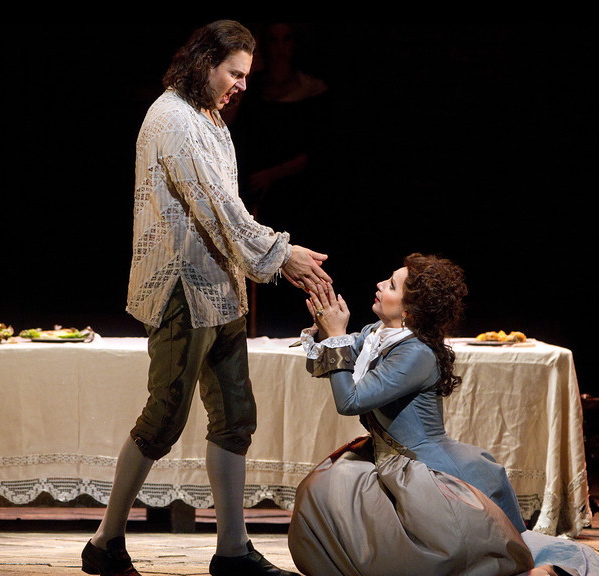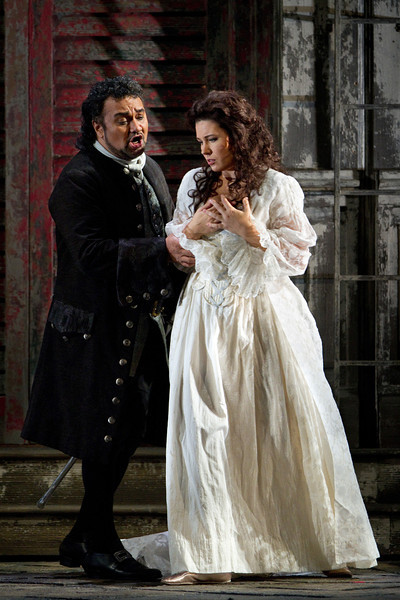Two superb Dons and striking visuals make up for lack of dramatic focus in Met’s new “Don Giovanni”

Peter Mattei in the title role and Barbara Frittoli as Donna Elvira in Mozart's "Don Giovanni," which opened Thursday night at the Metropolitan Opera. Photo: Marty Sohl/Metropolitan Opera
“The old is dying and the new cannot be born; in this interregnum a great variety of morbid symptoms appear.”
The director Joseph Losey began his 1979 film of Mozart’s Don Giovanni with that quotation from the prison notebooks of the Italian communist Antonio Gramsci. While some opera fans resented the intrusion of politics into what they prefer to think of as park-and-bark palaver, Losey’s point was well taken: Don Giovanni, composed in 1787 to a libretto by Lorenzo da Ponte, seethes with class anger no less than the more overtly revolutionary Le nozze di Figaro.
Glints of that anger lit up the Metropolitan Opera’s beautifully designed but fitfully unfocused new production of Don Giovanni, which opened on Thursday evening. Don Giovanni accepts a handshake from the peasant Masetto with patronizing bonhomie; he takes and discards lower-class women (including his servant Leporello’s would-be sweetheart) with brutal heedlessness. The handsome unit set (towers with balconies that close to form claustrophobic alleys and swing open for the ballroom and banquet scenes) is strongly vertical, encouraging thoughts of rank and hierarchy even as its geometric regularity tells of the numbing, compulsive sameness of Don Giovanni’s conquests.
In Peter Mattei, the Met has a Don Giovanni who is supremely charismatic for all of his bullying and pique. Mattei joined the opening-night cast almost at the last moment, when Mariusz Kwiecien suffered a back injury in rehearsal. (Kwiecien is scheduled to step
into the role on October 31.).
In the meantime, the tall, elegant Mattei sings with suave, plush tone whether standing still or, as in the case of Finch’han dal vino, dashing about the stage in feverish excitement. Mattei possesses that elusive quality known as sprezzatura: the art that conceals art, accomplishing difficult tasks without seeming effort or thought. It helps explain why his Don Giovanni remains fascinating even as he repels, groping very young girls (the “young beginners” evoked by Leporello in the catalogue aria) or wooing Donna Elvira with an ardor both engulfing and calculated.

Ramón Vargas as Don Ottavio and Marina Rebeka as Donna Anna in the Met's new production of Mozart's "Don Giovanni." Photo: Marty Sohl/Metropolitan Opera
The role of Don Ottavio is sometimes entrusted to pallid, oratorio-style tenors. As Maria Callas admonished her Juilliard students, Mozart must be sung with the same “frankness” and full-blooded approach that one would use in Verdi. Verdi indeed came to mind with Ramón Vargas’s Dalla sua pace—not the noisy, extroverted composer of Di quella pira but the rapt, inward Verdi of Quando le sere al placido (from Luisa Miller).
Vargas sang the aria in an ecstatic mezza voce and at a prodigiously slow tempo, spinning a hushed thread of tone that had audience members holding their breath. His performance was risky, gorgeous, and utterly enthralling, and received a loud and well-earned ovation. Vargas took chances in Il mio tesoro, as well, singing the aria’s long, intricate lines in a single breath, his tone dark and beautiful from top to bottom.
The remaining cast members were less consistent. Fluttery, untidy tone early on marred the performance of Barbara Frittoli, who was a lovely Donna Elvira at the Met in 2009. She was on better form in the second act, singing with nobility and pathos in the balcony scene and begging Don Giovanni to mend his ways with heartrending devotion.
Luca Pisaroni as Leporello brought irresistible energy to his portrayal and delivered da Ponte’s text with stinging gusto; his tone, while attractive, is a touch lean and monochromatic.
Two artists made their Met debuts in this new staging: Marina Rebeka as Donna Anna and Mojca Erdmann as Zerlina. An imposing presence, Rebeka has a bright, gleaming voice that seems to grow in strength as it ascends. Donna Anna’s ferociously difficult arias held no terrors for her, though (like many a present-day Donna Anna) she fudged the trill in Non mi dir, and her vocalism wants for a greater variety of dynamics and color. Erdmann — who has a swanky new Deutsche Grammophon recording to her credit — portrayed Zerlina with fetching grace and sensuality, but her voice sounded thin and reedy in the cavernous confines of the Metropolitan Opera House.
Joshua Bloom sang Masetto with lush, plummy tone, and Štefan Kocán was a formidable Commendatore. Fabio Luisi’s conducting offered much to admire—the queasy, ominous chromatic figures in the overture, the deliciously sensual accompaniment to Vedrai, carino, and much more besides. That said, the Act I finale nearly dissolved into chaos, not because of Mozart’s polymetric writing but because the maestro sometimes seemed to be pressing forward heedless of his lagging singers.
Ben Wright’s rumbustious choreography and Christopher Oram’s sets and costumes, in rich, dusty Gainsborough tones, were splendid. In Michael Grandage’s staging, the flames of hell burn to spectacular and terrifying effect as Don Giovanni sinks into the abyss, but much remains unclear. Why, for example, does Don Giovanni go on grabbing a gimpy, twitching leg as he nears his journey’s end? Was Peter Mattei suffering a cramp, or is Grandage’s Don Giovanni supposed to bring to mind Lord Byron, the demon Asmodeus, and other diables boiteux (“limping demons”)?
No matter; while directors fumble for epigraphs and metaphors, Mozart’s Don Giovanni endures, bleak and uproarious, forever eluding our grasp.
Don Giovanni runs through November 11 and from February 21 to March 17, 2012. metoperafamily.org/metopera/;
212-362-6000.
Marion Lignana Rosenberg is a writer and translator based in New York. Her website is mondo-marion.com.